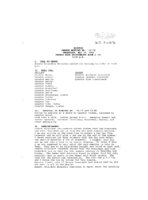Search the Special Collections and Archives Portal
Search Results

Interview with Ann G. Dye, November 1, 2004
Date
Archival Collection
Description
Text

Gene Noboru Nakanishi oral history interview: transcript
Date
Archival Collection
Description
Oral history interview with Gene Noboru Nakanishi conducted by Ayrton Yamaguchi, Cecilia Winchell, and Stefani Evans on April 2, 2021 for Reflections: The Las Vegas Asian American and Pacific Islander Oral History Project. Gene Nakanishi shares his detailed family history from both his father's and his mother's families. He discusses his paternal grandfather's work on the Union Pacific Railroad, the family's internment in Wyoming during World War II, and his father's release from the camp by joining the United States Army Signal Corps. Nakanishi also talks of his maternal grandfather who was of the Bushido ("warrior") class in Osaka, Japan, and his grandfather's work with Christian missionaries. He shares details of his mother's restaurant employment in Los Angeles and her opening of Osaka Japanese Bistro in Las Vegas in 1969. Nakanishi also talks about being born and raised in Las Vegas, his musical schooling at Berklee College of Music in Boston, and his graduate education at Harvard University. He discusses his work as a band teacher for the Clark County School District, his involvement in the Idyllwild Arts Summer Program band camp, and his interests in jazz music.
Text

Margo Knowles interview, March 25, 1981: transcript
Date
Archival Collection
Description
From the Ralph Roske Oral History Project on Early Las Vegas, OH-01039. On March 25, 1981, collector Sonny Neighbors interviewed his mother, Margo Knowles (born October 13th, 1935 in Cedar Rapids, Iowa) at her home in Las Vegas, Nevada. Margo speaks about growing up and going to school in Las Vegas. She also discusses her work as a telephone operator in Las Vegas, and at the Nevada Test Site in Nye County, Nevada.
Text

Transcript of interview with Robert D. Howell by Joe Sant, February 26, 1977
Date
Archival Collection
Description
On February 26, 1977, collector Joe Sant interviewed local Nevadan business owner, Robert D. Howell (born November 22nd, 1939 in Las Vegas, Nevada) in his home in Las Vegas, Nevada. This interview covers Las Vegas in the old days, from Mr. Howell’s personal experience of being born and raised in Nevada. During this interview, Mr. Howell also discusses the early above ground atomic tests, local environmental and social changes, the economic landscape, the Mormon Fort, religious beliefs, and local recreation. The interview concludes with discussion on air pollution.
Text

Laura Gentry interview, February 26, 1977: transcript
Date
Archival Collection
Description
On February 26, 1977, collector Harold May interviewed Laura Gentry (born May 1897 in St. Thomas, Nevada) at her cabin in Gold Butte, Nevada. In this interview, Laura Gentry discusses living in St. Thomas and Overton, Nevada. She discusses the development of the Overton and Gold Butte areas of Nevada as well as the people involved in mining in these areas.
Text

Transcript of interview with Fred Gibson by Maisie Gibson, March 9, 1975
Date
Archival Collection
Description
On March 9, 1975, Maisie Gibson interviewed Fred Gibson (born 1927 in Golden, Colorado) about his life in Nevada. Gibson first talks about his family’s background, their move to Nevada, and his education in early Las Vegas schools. He also mentions his service in the U.S. Army, his college education, and his occupation as an engineer at various companies. Gibson then talks about the various locations at which he has lived, his membership in clubs and charitable organizations, and his memories of the first properties on Fremont Street as well as those of the Helldorado Parade. The interview then covers the topics of mining, the atomic testing, economic and environmental changes, and social changes. The interview concludes with a discussion on the growth and development of Henderson, Nevada.
Text

Transcript of interview with Elbert Edwards by Ronald Johns, 1972
Date
Archival Collection
Description
On an unspecified date in 1972, Ronald Johns interviewed Elbert Edwards (born 1907 in Panaca, Nevada) about his life in Southern Nevada. Edwards first talks about his family’s move to Panaca, Nevada in 1864 and talks briefly about his work in Las Vegas public schools during the Great Depression. The two also discuss the Boulder Dam, Edwards’ involvement in politics, and mining in Nevada. He also talks about the cost to build a home in Las Vegas in 1936, the development of Boulder City, and the way of life in the small town of Panaca. The interview then moves on to the topics of the early territorial boundaries of Nevada and Utah, the atomic testing at the Nevada Test Site, and early water sources in Southern Nevada.
Text

Meeting minutes for Consolidated Student Senate University of Nevada, Las Vegas, May 19, 1993
Date
Archival Collection
Description
Text

Interview with Katie McWilliam, July 9, 2004
Date
Archival Collection
Description
Access note: Audio temporarily sealed
Text

Interview with Charles E. Violet, May 22, 2004
Date
Archival Collection
Description
Text
